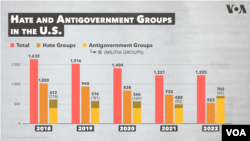There is a sense among senior U.S. counterterrorism officials that the actions of a handful of Americans are helping to drive the growth of racist and far-right extremist groups around the world.
Specifically, these officials point to mass shootings and other high-profile attacks in the United States, which have helped to turn the perpetrators into martyrs for like-minded groups and individuals.
“I don't want to put up a number on it or anything. I can't quantify it,” U.S. Homeland Security Counterterrorism Coordinator Nicholas Rasmussen told a virtual security conference Tuesday.
“But unfortunately, it happens far too often, where Americans or people in the United States who carried out these horrific events, or attacks, do serve as inspiration and contribute to radicalization in other parts of the world,” he said. “Their names, their belief systems show up in the writings or utterances of attackers who engage in that kind of activity overseas.”
The concern is not new; researchers, Western officials and even some former U.S. lawmakers have for years shared apprehensions that U.S.-based groups have played a critical role in the spread of racist and far-right ideologies.
The U.S.-based Anti-Defamation League, for example, noted in 2019 that Dylan Roof, convicted for the murder of nine people during a racially motivated shooting at a church in South Carolina in 2015, was being lionized on right-wing internet forums.
More recently, former State Department Counterterrorism Coordinator Nathan Sales warned U.S. lawmakers that American white supremacists in particular are altering the threat landscape.
“What happens in the United States influences what happens overseas and what happens overseas influences attacks in the United States," Sales said. "These extremist networks are talking to one another."
One former congressman, Max Rose, went as far as to warn that U.S. white supremacist extremists are exporting far-right creeds in almost the same way that radical imams in parts of the Middle East exported the jihadist ideologies that fueled terror groups like al-Qaida and the Islamic State.
But while those terror groups remain a threat, Rasmussen warned Tuesday that they have been overtaken, when it comes to the danger on U.S. soil, by domestic extremists, including those espousing white supremacist ideology.
"The balance has shifted pretty dramatically,” he told the Center for New American Security’s 2023 National Security Conference.
“It’s the domestic extremism set of threats that now are greater in volume, frequency and even lethality in the current environment, and that's source of deep concern," he said.
Worries in Canada
Like their U.S. counterparts, Canadian officials are also expressing concern.
“Since 2014 we've had attacks that have killed 26 people, wounded 46 others in seven separate events that we would term IMVE [ideologically motivated violent extremism], so this has been a top-of-mind issue,” said Lesley Soper, director general of national security policy for the Canadian Department of Public Safety and Emergency Preparedness.
“We've come to understand about this particular outlook is that it can be drawn from a wide range of grievances and ideas from across the political spectrum, and it's animated, of course, by technology,” she told the conference Tuesday.
Soper said online forums like YouTube channels, gaming platforms and other spaces continue to give racially motivated extremists room to gather and grow.
"We haven't made the inroads past some of the key Western-held platforms to really break the back of, slowing down the circulation of terrorist content online that are really continuing to drive radicalization,” she said. “There is like a shared accountability that needs to be taken up with [a] little more fervor by technology platforms."






